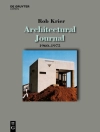Analysing a variety of international films and, ultimately, placing them in dialogue with video art, photographic narratives and emerging digital image-based technologies, the contributions explore the expanding range of ‘mediated’ narratives of contemporary architecture and urban culture from both a media and a sociological standpoint. Each chapter presents an interesting critical approach to the diversity of topics with clear explanation of the contextual framework and methodology, and a consistent depth of analysis.
In the three sections of the book, authors underline the continual role of film and media in creating moving image narratives of the city, identifying how it creates cinematic – and ever more frequently digital – topographies of contemporary urban culture and architecture, re-presenting familiar cities, modes of seeing, cultures and social questions in unfamiliar ways. This filmic emphasis is placed into dialogue with a more diverse range of related visual media, which illustrates the overlaps between them and reveals how moving image technologies create unique visual topographies of contemporary urban culture and architecture.
In making this shift from the filmic to the new age of digital image making and alternative modes of image consumption, the book not only reveals new techniques of representation, mediation and the augmentation of sensorial reality for city dwellers; its emphasis on ‘narrative’ offers insights into critical societal issues. These include cultural identity, diversity, memory and spatial politics, as they are both informed by and represented in various media.
The focus for the book is on how films can produce mediation of urban life and culture by connecting the notions of identity, diversity and memory. Both the subject and the approach are gaining in popularity in recent years. This book’s main feature is its dual perspective, involving both practical and theoretical stances – and it is this approach that makes it a particularly relevant and original contribution.
Primary readership will be academics, scholars, undergraduate and postgraduate students and practitioners interested in architecture and media in general, film, moving images, urban studies in particular. Also of relevance to sociologists and those interested in cultural theory. The inclusion of chapters on urban photography and art installations may also be of interest to students and designers in these areas.
Mục lục
Foreword
François Penz
Introduction: Narrative Topographies of City and Urban Culture in Moving Images in the Age of Digitalization
Ayşegül Akçay Kavakoğlu, T. Nihan Hacıömeroğlu and Lisa Landrum
Part I: Identity in Mediated Realms
1. Looking Up, Looking Down, Looking Awry
Louis D’Arcy-Reed
2. Materiality and the Maternal: Spatial Politics and Agency of the Cinematic Apartment in Japanese Horror Films
Shana Sanusi
3. Tehran Has No Soul!
Tania Ahmadi
4. The Unconscious and the City: A Neuropsychoanalytic Exploration of Cinematic Space
Susannah Gent
5. A Vision of Complexity: From Meaning and Form to Pattern and Code
Loukia Tsafoulia and Severino Alfonso
Part II: Narrated Diversity of Filmic Urban Culture
6. Architecture of Constructed Situation: Understanding the Perception of Urban Space through Media
Katarina Andjelkovic
7. Polyphonic Asia: Contemporary City Symphonies of Singapore and Seoul
Simone Shu-Yeng Chung
8. Cinema and the Walled City
Gül Kaçmaz Erk
9. Architectures of the Suspended Moment
Jean Boyd
Part III: Narrated Memories of Mediated Urban Life
10. The City Is a Changing Medium: Imagining New York and Los Angeles in Doug Aitken’s Work
Gracia Ramírez
11. Loss in Space: Deconstructing Urban Rephotography
Michael Schofield
12. Filming Chinese Settlement in Malaysia: Cinematic Narrative and Urban Settings
Wang Changsong
13. Bringing People Together Now: Wong Kar-Wai and Hong Kong
Kimberly Connerton
14. Multimedia Architectures: Case Study – Herakleion, a History of a City
Giorgos Papakonstantinou
Afterword
Neo-formalism and the Architectural Lessons of Film
Graham Cairns
Index
Giới thiệu về tác giả
Graham Cairns is a visiting scholar in architecture and design at both Florida State University and Ravensbourne, UK.












